2011版高中英语课时讲练通课件:Unit13《People》Period1(北师大版必修5)
文档属性
| 名称 | 2011版高中英语课时讲练通课件:Unit13《People》Period1(北师大版必修5) |
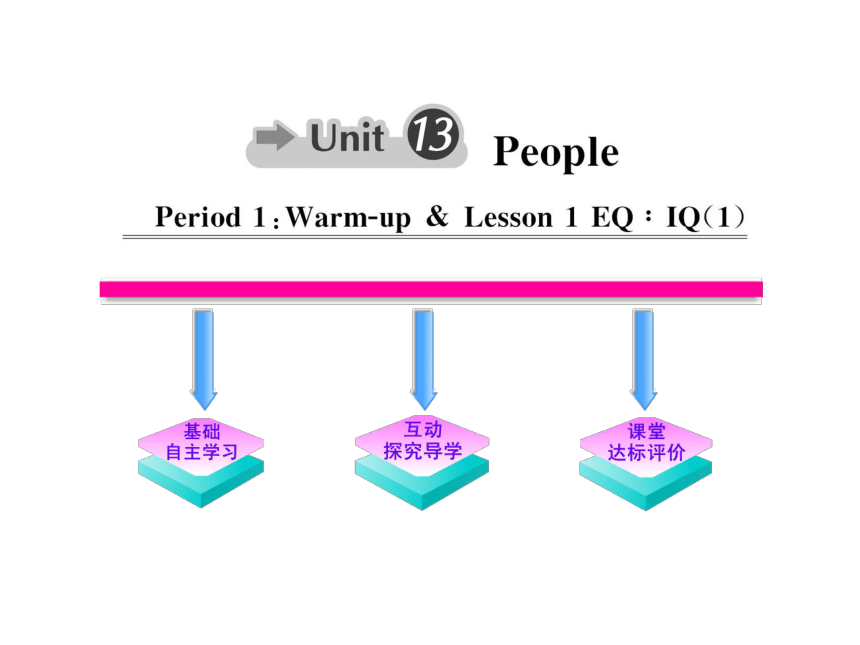
|
|
| 格式 | rar | ||
| 文件大小 | 3.8MB | ||
| 资源类型 | 教案 | ||
| 版本资源 | 北师大版 | ||
| 科目 | 英语 | ||
| 更新时间 | 2011-11-06 00:00:00 | ||
图片预览


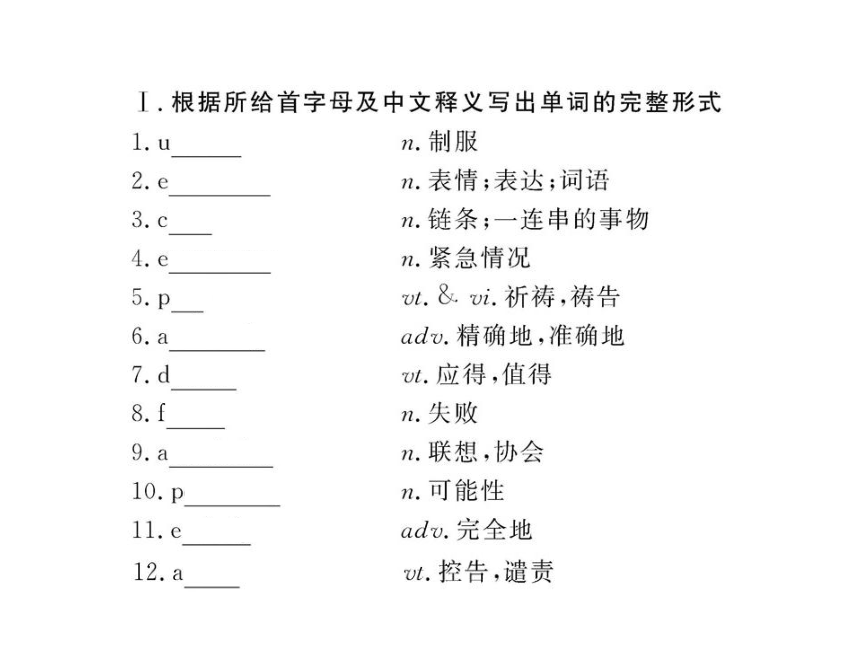
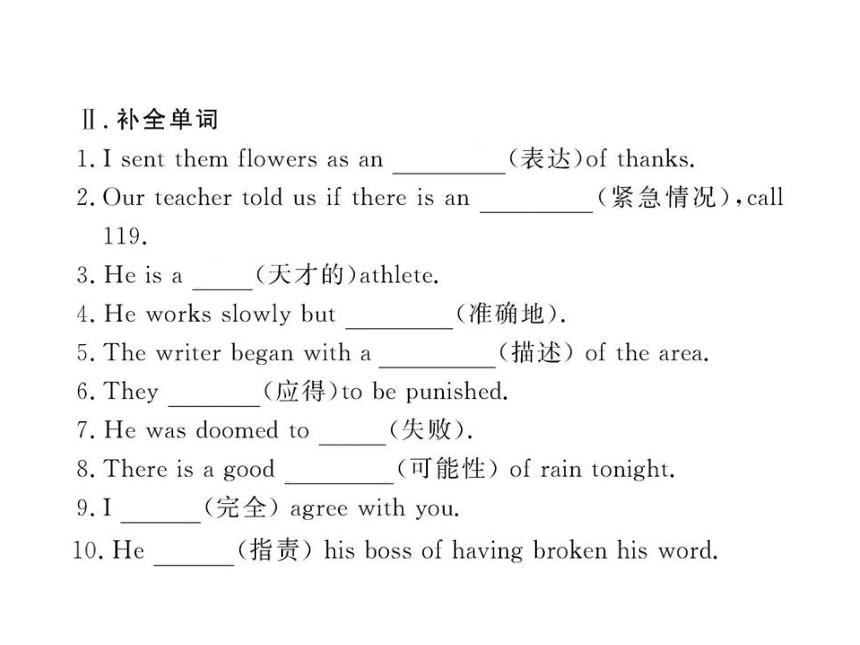
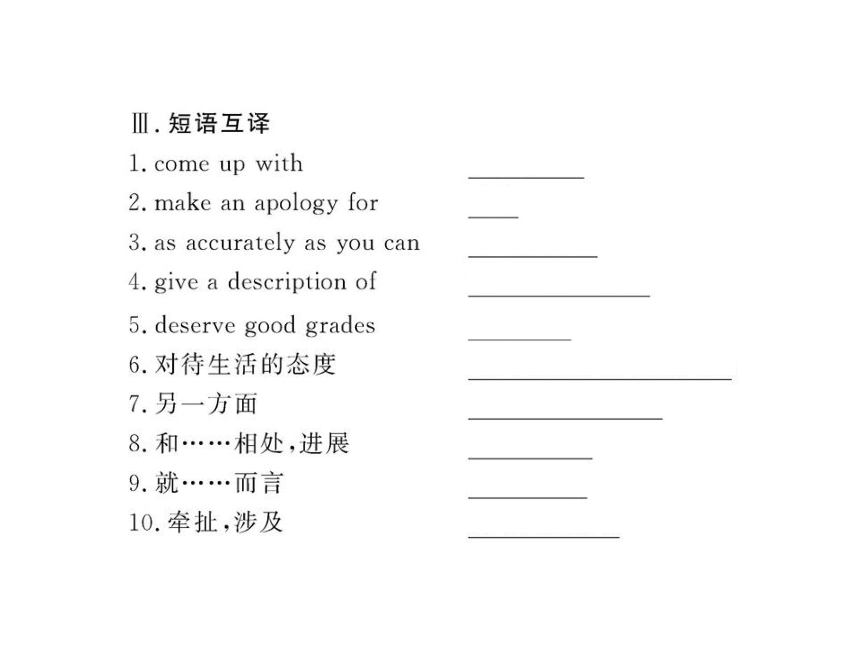



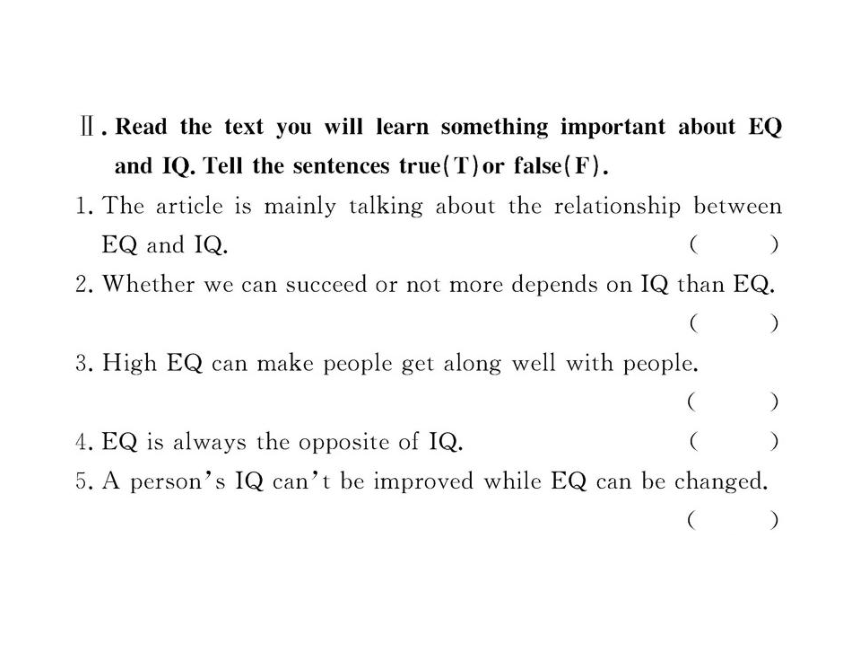
文档简介
(共23张PPT)
Ⅰ. 根据课文内容填写适当单词
1. Professor Salovey, who invented the term EQ, gives the following description(描述): At work, it is IQ that gets you hired but it is EQ that gets you promoted.
2. Supported by his academic (学术的) research, Professor Salovey suggests that when predicting (预测) someone’s future success, their character, as measured by EQ tests, might actually matter more than their IQ.
3. For example, have you ever wondered why some of the smartest students in your class, who you think deserve(应得)good grades, sometimes end up failing exams
4. Perhaps their failure (失败)is because of their low EQ.
5. Some are trying to study the possibility (可能性) of improving a person’s EQ, especially in terms of“people skills”, such as understanding and communication.
6. And the fact that it might be possible to raise EQs means that schools need to make sure that their students are receiving the education they really need, and know that their futures are not entirely (完全地) determined by their IQs.
Ⅱ. 用下列短语填空
even if, the result of, give a description of, end up, attitude towards, be likely to, get on with, deal with, in terms of, be determined to
1. The lady gave a description of the accident to the policeman in detail.
2. In terms of money, he’s quite rich, but not in terms of happiness.
3. John is likely to be in London this autumn.
4. How are you getting on with your experiments
5. Leigh takes a motherly attitude towards the Chinese girl.
6. You will end up in debt if you keep on spending money like that.
7. He will come on time even if it rains.
8. He has learnt to deal properly with all kinds of complicated situations.
9. She is determined to finish law school.
10. Do you know the result of the exciting match
Ⅲ. 将下列句子翻译成汉语
1. Even if they never see their results, they feel that their IQ is what determines how well they are going to do in life.
即使他们永远看不到他们的结果,他们仍然感觉到他们的智商决定了他们将来在生活中的发展状况。
2. When they see other students doing better than them, they usually believe that those students have a higher IQ and that there is nothing they can do to change facts.
当他们看到别的学生比他们做得好时,他们通常相信那些学生有较高的智商而他们却无法改变事实。
3. However, new research into EQ suggests that success is not simply the result of a high IQ.
然而,对情商的新研究表明,成功并不仅仅是高智商的结果。
4. While your IQ tells you how intelligent you are, your EQ tells you how well you use your intelligence.
你的智商表明你有多聪明,而你的情商表明你能多好地利用你的聪明才智。
5. At work, it is IQ that gets you hired but it is EQ that gets you promoted.
在职场上,是智商决定了你能否被录用,而情商则决定了你能否得到提升。
6. It is generally believed that people with high EQs are open to new ideas and have positive attitudes towards life.
人们通常认为高情商的人善于接受新观点,对生活持积极态度。
Ⅰ. 根据课文内容填写适当单词
1. Professor Salovey, who invented the term EQ, gives the following description(描述): At work, it is IQ that gets you hired but it is EQ that gets you promoted.
2. Supported by his academic (学术的) research, Professor Salovey suggests that when predicting (预测) someone’s future success, their character, as measured by EQ tests, might actually matter more than their IQ.
3. For example, have you ever wondered why some of the smartest students in your class, who you think deserve(应得)good grades, sometimes end up failing exams
4. Perhaps their failure (失败)is because of their low EQ.
5. Some are trying to study the possibility (可能性) of improving a person’s EQ, especially in terms of“people skills”, such as understanding and communication.
6. And the fact that it might be possible to raise EQs means that schools need to make sure that their students are receiving the education they really need, and know that their futures are not entirely (完全地) determined by their IQs.
Ⅱ. 用下列短语填空
even if, the result of, give a description of, end up, attitude towards, be likely to, get on with, deal with, in terms of, be determined to
1. The lady gave a description of the accident to the policeman in detail.
2. In terms of money, he’s quite rich, but not in terms of happiness.
3. John is likely to be in London this autumn.
4. How are you getting on with your experiments
5. Leigh takes a motherly attitude towards the Chinese girl.
6. You will end up in debt if you keep on spending money like that.
7. He will come on time even if it rains.
8. He has learnt to deal properly with all kinds of complicated situations.
9. She is determined to finish law school.
10. Do you know the result of the exciting match
Ⅲ. 将下列句子翻译成汉语
1. Even if they never see their results, they feel that their IQ is what determines how well they are going to do in life.
即使他们永远看不到他们的结果,他们仍然感觉到他们的智商决定了他们将来在生活中的发展状况。
2. When they see other students doing better than them, they usually believe that those students have a higher IQ and that there is nothing they can do to change facts.
当他们看到别的学生比他们做得好时,他们通常相信那些学生有较高的智商而他们却无法改变事实。
3. However, new research into EQ suggests that success is not simply the result of a high IQ.
然而,对情商的新研究表明,成功并不仅仅是高智商的结果。
4. While your IQ tells you how intelligent you are, your EQ tells you how well you use your intelligence.
你的智商表明你有多聪明,而你的情商表明你能多好地利用你的聪明才智。
5. At work, it is IQ that gets you hired but it is EQ that gets you promoted.
在职场上,是智商决定了你能否被录用,而情商则决定了你能否得到提升。
6. It is generally believed that people with high EQs are open to new ideas and have positive attitudes towards life.
人们通常认为高情商的人善于接受新观点,对生活持积极态度。
